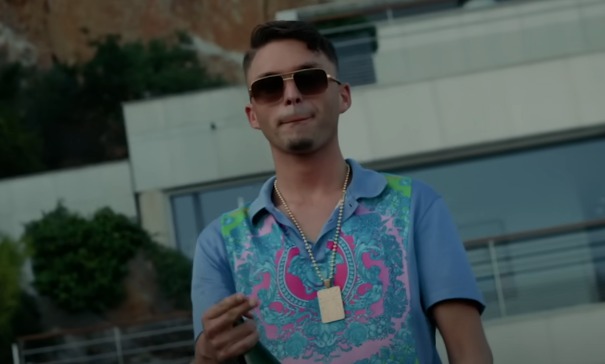One of Denmark’s most significant musicians, both financially and artistically, is Kian Rosenberg Larsson, better known by his stage name Gilli. With roots in Rødovre culture and years of involvement in Copenhagen’s raw rap scene, Gilli’s path is remarkably similar to that of other international celebrities who have made a fortune by remaining loyal to their roots. His journey, which includes everything from viral soundtracks to solo albums that top the charts, demonstrates how art based on personal experience can be incredibly successful in creating long-term financial sustainability.
Gilli did more than simply enter the entertainment industry by playing a fictionalized version of himself in the musical drama Ækte vare; he changed it. His early prominence was especially enhanced by the dynamic synergy between music and film that resulted from that breakthrough moment in 2014. The film’s realistic depiction of immigrant hardships and urban youth struck a chord with viewers of all ages, particularly younger Danes juggling multiple identities. Gilli’s lyrical depth and vocal cadence started attracting millions of streams on the soundtrack as the movie gained popularity. That momentum would set the stage for a career that has significantly improved in terms of both creative depth and financial returns over the last ten years.
Gilli – Personal and Professional Summary
| Category | Details |
|---|---|
| Full Name | Kian Rosenberg Larsson |
| Stage Name | Gilli |
| Date of Birth | June 27, 1992 |
| Birthplace | Rødovre, Denmark |
| Nationality | Danish |
| Profession | Rapper, Singer, Songwriter |
| Genres | Hip Hop, Urban, Danish Rap |
| Years Active | 2010–present |
| Labels | disco:wax, Uropa, MXIII, ArtPeople |
| Estimated Net Worth | $783,000 (2023), projected to exceed $1 million in 2025 |
| Breakthrough Role | Ækte vare (2014) |
| Notable Albums | Kiko (2019), Euro Connection (2020 with Branco) |
| Top Collaborators | Branco, Kesi, Sivas, Medina, MellemFingaMuzik |
| Reference Source | Popnable Gilli Net Worth |
Gilli has transformed from a local lyricist to a highly effective brand engine in recent years, especially with his solo album Kiko. Not only did that 2019 release top the charts, but 13 of its 16 tracks simultaneously ranked on the singles chart, making it a record in Denmark. This achievement demonstrates Gilli’s enduring popularity in a nation with a relatively small population and a specialized rap audience. Fans far beyond Denmark are moved by his music, which frequently carries themes of resiliency, cultural duality, and personal victory.

Gilli extended his influence into German-speaking and Scandinavian regions by working with Branco on Euro Connection, producing a particularly inventive blueprint for regional domination. The fact that “La Danza” and “Back to Business” both peaked at number one shows that their collaborative artistry is a successful business endeavor rather than a passing fad. These partnerships demonstrate a business-savvy approach by fusing incisive production and marketing with gripping lyrical storytelling.
Driven by social realism and multicultural authenticity, Scandinavian rap has emerged as a dominant genre in recent years. At the vanguard of that movement is Gilli. In contrast to the glitzy extravagances of American rap videos, his images tend to tell a subtle story. His tone is both melodic and gritty, reflecting the tension of everyday life while displaying poetic maturity. Together with his dedication to language and lyrical identity, that artistry has greatly narrowed the divide between mainstream and street audiences.
Gilli’s approach to fame is remarkably similar to that of his peers, such as Ninho of France or Dave of the UK; they are culturally grounded, significantly enhanced by their connection to local narratives, and motivated more by substance than by spectacle. In addition to music, Gilli has influenced fashion, language, and youth identity. Some of the phrases he made famous in his lyrics now have meanings that go well beyond the beat in Danish urban slang.
Through clever licensing deals and strategic alliances, Gilli has subtly developed a varied revenue source. His royalties continue to flow at a large scale thanks to regional distributors, Spotify, YouTube, and Apple Music. He continues to be a highly adaptable figure in music entrepreneurship by fusing international platforms with local fan loyalty—all without the label dependency that many artists are subject to. He easily ranks among Denmark’s highest-earning independent artists based solely on his streaming revenue.
Gilli has become a sort of cultural ambassador in the context of Scandinavia’s increasing multiculturalism, representing not only Denmark’s music scene but also its changing identity. He is especially helpful in discussions about inclusion, representation, and youth empowerment because his lyrics frequently convey emotional nuance, societal critique, and personal truths.
Gilli’s artistic and financial trajectory provides an inspiring path for upcoming artists from European cities. He has shown that it is possible to stay loyal to one’s story and still achieve financial success. Similar to Stormzy’s impact in the UK or Kendrick Lamar’s in the US, Gilli’s ascent shows that in music, depth and financial success are not mutually exclusive.
His career has been growing steadily since 2010 without the drama or excessive publicity that come with being a well-known rapper. His brand has been remarkably successful in retaining long-term relevance because of his intentionality, which is demonstrated by his well-curated features, carefully released albums, and constant audience engagement. His understated online persona and well chosen interviews further contribute to his mystique, a tactic that has been incredibly successful in maintaining a positive public image without becoming overly saturated.
Compared to his less tech-savvy peers, Gilli’s business model has scaled revenue much more quickly by utilizing digital tools and cultivating a devoted local fan base. In addition, he has made references to producing other musicians and looking into independent label arrangements, both of which could strengthen his long-term financial position. As European hip hop continues to grow, musicians like Gilli will influence not only the genre’s sound but also its financial climate in the years to come.


